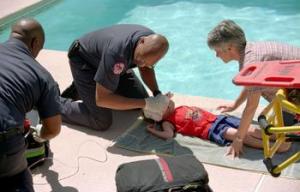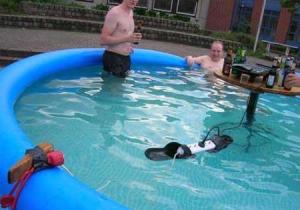 There are many swimming pool dangers that homeowners and pool guests should be aware of in order to minimize the risks associated with this popular recreational and exercise activity.
There are many swimming pool dangers that homeowners and pool guests should be aware of in order to minimize the risks associated with this popular recreational and exercise activity.
When Fun is Dangerous
A visit to a family or public swimming pool is a popular summer event, and many warmer regions have open pools throughout the year. Furthermore, pools are common features of hotels, cruise ships, resorts and fitness centers. But while they may be popular, pools can also be dangerous. This overview of the most common swimming pool dangers can help pool guests minimize risks and still have a splashing good time.
Types of Swimming Pool Dangers
Hundreds of people – many of them young children – are injured or killed in swimming pool accidents each year. There are many types of dangers to be aware of, but fortunately there are also many precautions that can virtually eliminate the risks associated with pools.
Drowning
Drowning is the most familiar pool danger but it is also the most preventable. Individuals can drown in very short periods of time, and even near-drowning accidents can result in permanent debilitating injuries.
To minimize the risk of drowning:
- Install pool safety fences and covers to limit pool access.
- Arrange swimming lessons for everyone who will use the pool.
- Always supervise children while the pool is being used.
- Be aware of the pool depth and follow “no diving” restrictions in shallow pools.
- Keep lifesaving equipment close to the pool at all times.
- Stress proper pool behavior and limit horseplay.
Disease
Many types of bacteria can survive quite happily in swimming pools, circulating among different swimmers to spread illness.
To avoid potential diseases:
- Keep the pool water properly filtered and chemically treated at all times.
- Refrain from using a pool if you are sick or have an open wound.
- Do not allow children wearing diapers to use the pool unless they are wearing swim diapers.
- Keep pets out of the pool.
- Use a shower or hose to rinse your entire body before and after using the pool.
- Do not swallow pool water.
- Avoid swimming pools that appear to have questionable cleanliness standards.
Chemical Exposure
The chemicals used to keep pools clean and safe can be dangerously toxic in high amounts. Chlorine, for example, can dry and irritate skin as well as aggravate asthma. These chemicals can also kill the body’s naturally beneficial bacteria if water is swallowed, potentially causing digestive problems and lowered immunity.
To avoid the chemical contamination dangers of swimming pools:
- Keep chemical treatments at the proper level.
- Do not increase chemical treatments to compensate for a dirty pool.
- Follow instructions carefully when treating a pool.
- Keep pool chemicals properly stored and out of reach of children to avoid accidental poisonings.
- Store chemicals in a cool, dry place to avoid landscape contamination or risk of fire.
Electrical Shock
Both water and chlorine are excellent conductors of electricity, making swimming pools very hazardous in unsafe electrical conditions.
To avoid the risk of electrical shock when using a swimming pool:
- Do not keep ungrounded electrical equipment – stereos, grills, lawn equipment, etc. – near the pool.
- Use only ground circuit fault interrupter (GCFI) outlets in the pool area.
- Stay out of the pool during lightning storms.
Food Problems
A picnic or snacks by the pool is nearly as much of a summer tradition as swimming itself, but food near the pool risks contamination of the water and other hazards.
To avoid problems when food is combined with the pool:
- Do not drink alcohol when swimming because it can impair the ability to judge distances as well as the physical coordination necessary to swim.
- Do not swim for at least 30 minutes after consuming a heavy meal.
- Do not use glass containers or sharp utensils in the pool area.
- Keep food out of the pool to avoid overtaxing the filtration system.
Sunburn
Individuals who spend a lot of time at the swimming pool frequently develop golden tans, but at the same time overexposure to the sun’s radiation drastically increases the risks of skin cancer. Furthermore, sunburns can be painful and can create open sores and blisters that can become infected.
To avoid too much sun:
- Stay in shaded lounging areas when not in the pool.
- Apply water-resistant sunscreen every two hours while using the pool.
- Avoid staying in the sun in the late morning and afternoon hours when the sun’s rays are strongest.
- Wear swimsuit covers to limit the amount of exposed skin.
From water guns and inflatable lounges to buoys and basketball hoops, pool toys offer hours of fun entertainment for swimmers. There are risks associated with these toys, however, that can add to the swimming pool dangers that players face.
To avoid pool toy problems:
- Use only toys designed for use in swimming pools.
- Store toys away from the pool area when not in use.
- Pool toys, including water wings, are not meant to be used as lifesaving devices and are not substitutes for flotation devices.
Inflatable Dangers
Small inflatable pools have their own set of risks that parents should be aware of. These pools can become lopsided and unbalanced, and because many of them are filled from a standard hose they do not contain the filtered, treated water that standard swimming pools do. Furthermore, inflatable pools can collapse or blow away in severe weather.
To avoid these risks with inflatable pools:
- Inspect the pool regularly for weak points, tears or punctures.
- Do not exceed the recommended weight and other use tolerances for the pool.
- Anchor the pool securely in a flat, stable location to prevent tips.
- Drain the pool daily to avoid contamination from standing water.
Final Thought
There are many different swimming pool dangers that swimmers face regularly, but with proper precautions and common sense many risks can be minimized while still maximizing the enjoyment of a fun day at the pool.



